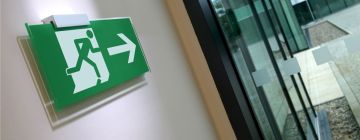
What is Fire Engineering?
This industry-focused programme is responding to the developing skills shortage in Fire Engineering in the construction sector. Many serious fire related incidences have brought the issue of good fire engineering practice into the public realm. Recent events like Priory Hall and Millfield Manor Housing Estate in Ireland and Grenfell Towers in London raise questions about the competencies of construction professionals relating to fire safety in buildings. There is now growing awareness of fire safety design and a growing need to have construction professionals trained in this area.
The introduction of the Building Control Amendment Regulations (BCAR) has had a very significant effect on the way building design and construction is managed and implemented. Consequently, employers are increasingly looking for employees with specific sets of fire safety engineering skills for all construction phases including specification, design, installation, certification, inspection, management & maintenance of passive and active fire protection systems in buildings.
The course has been designed to allow construction professionals from architectural and consulting engineering practices, construction contractors, M&E contractors, building surveyors, building product suppliers, property risk assessment and insurance personnel, Fire Service and Fire Industry personnel to upskill and gain a qualification in fire engineering.
On Successful completion of the programme the student will be able to:
- Investigate the phenomena and effects of fire and of the reaction and behaviour of people to fire, and to apply this knowledge to protect people, property and the environment from the destructive effects.
- Generalise the scientific and technical principles underlying fire and fire fighting systems and design requirements of engineering projects.
- Research and successfully complete fire engineering projects, both technical and managerial, within time and cost constraints and relevant national and international directives, and communicate effectively their resolution.
- Solve common fire engineering problems through systematic analysis and design methods.
- Apply their knowledge of fire safety and fire safety systems legislation to evaluate it's impact on the design and approval of building designs and fire safety systems.
- Define the responsibilities of an engineering technologist and exercise independent technical judgement with significant autonomy.
- Explore the wider social, political, business and economic context of the fire engineering professionalism.
Delivery
The programme is delivered using a blended approach with 50% of programme content delivered face to face on campus and 50% online. Lectures are delivered on Friday (9am to 6pm) and Saturday (9am to 1pm). There are 7 Friday/Saturday sessions per semester, typically every second weekend. Participants attend lectures on campus for one Friday/Saturday session per month. The online components of the course are all delivered ‘live’ and are not recorded for viewing at a later time. This ensures greater student participation and peer to peer learning.
Modules are assessed by a combination of in class tests, continual assessments and final exams.
| Semester 1 | Semester 2 | Semester 3 |
|---|---|---|
| Intro to Fire Engineering | Fire Safety 2 | Fire Dynamics |
| Fire Safety 1 | Passive Fire Safety Systems | Fire Service Management |
| Active Fire Safety Systems | Fire Safety Management | Application of Fire Safety Engineering |
| Fire Service Legislation | Fire Science | Fire Engineering Project |
Minor Awards*
For people who can't take on the full course there are also shorter courses- or 'minor awards' - available.
- Certificate in Fire Science - WD_CFSCI_MA
- Certificate in Fire Safety Systems- WD_CFRSY_MA
- Certificate in Fire Legislation - WD_CFRLG_MA
- Certificate in Fire Safety - WD_CFIRS_MA
- Certificate in Fire Safety Management - WD_CSAFE_MA
- Applicants who have completed a minimum NQF Level 6 programme in fire engineering or in a cognate area of study will be eligible for entry to the programme. Cognate discipline areas of study include: civil engineering, construction studies, construction management, architecture, architectural technology, building services, building surveying, quantity surveying, energy engineering or energy management.
- Applicants who have a senior trades apprenticeship qualification with a minimum of 2 years relevant experience will be eligible for entry to the programme. A trades qualification is equivalent to an NQF Level 6 qualification.
Entry to the programme may also be allowed via the Institute’s Recognition of Prior Learning (RPL) process on an individual case-by-case basis. This RPL process includes the matching of the candidate’s prior learning (education and experiential) with the equivalent Level 6 programme outcomes. - Retained fire officers with a minimum of 7 years’ experience and full time fire officers with a minimum of 5 years’ experience will be eligible for entry to the programme under RPL.
- Applicants whose first language is not English must submit evidence of competency in English as per the English language requirements for a Level 7 Engineering programme.
The programme provides pathways for graduates into the Fire Engineering industry where they can engage in fire safety design, management, auditing, compliance checking and certification
Course Leader

Mr Colm Tynan
Programme Leader, BEng (Hons) in Sustainable Energy Engineering -
Call: +35351302069
Email: [email protected]
Profile
